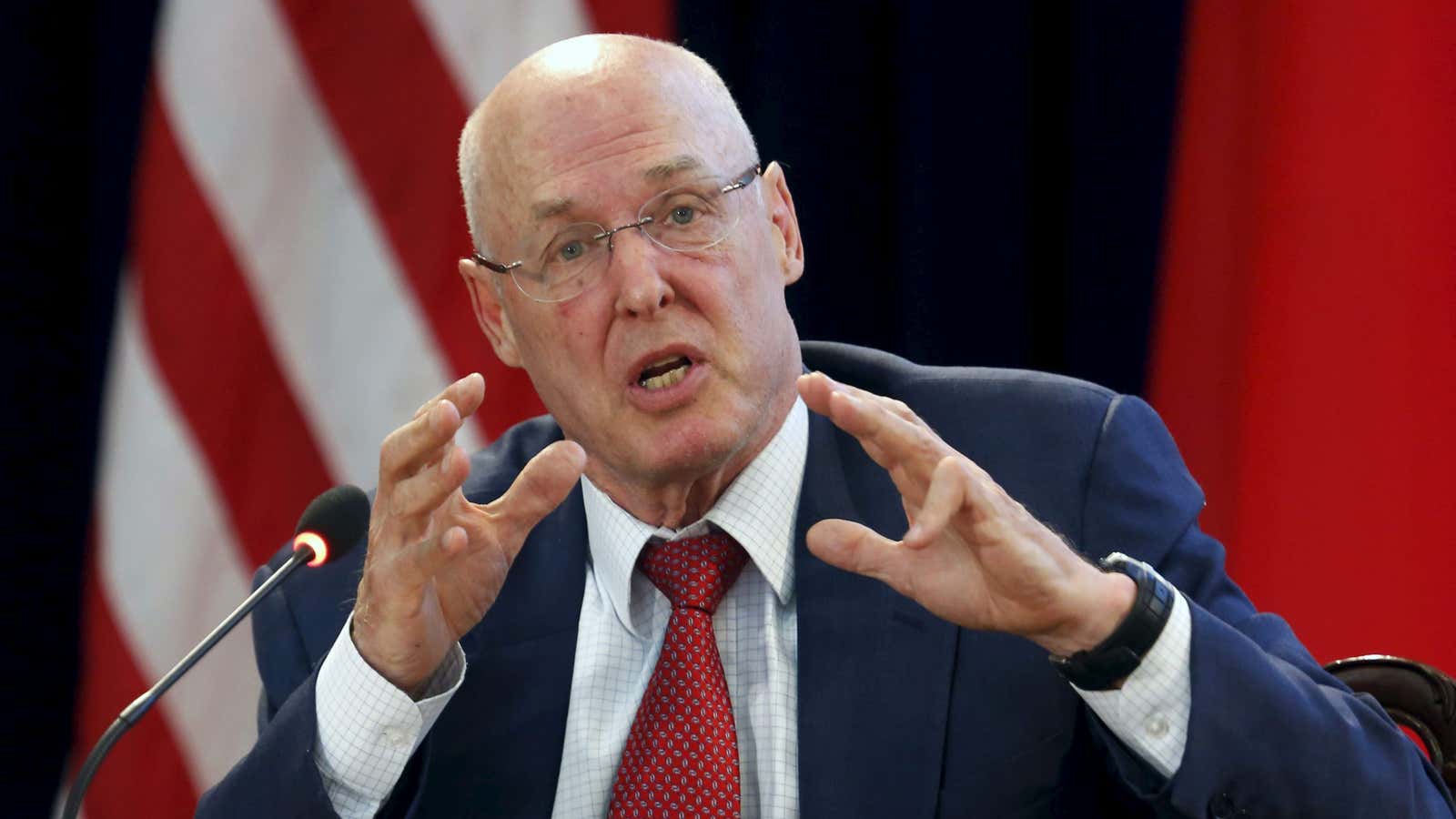Henry Paulson turned down one of the highest posts in the U.S. government—Secretary of the Treasury—three times before he realized what was holding him back. “I just realized that it was fear of failure,” he said during a recent discussion with Stanford Graduate School of Business students. “And as soon as I realized that, I said, ‘Well, I’m not going to give into that,’ and I accepted.”
It turned out there was something to be afraid of: Two years after he was confirmed by the Senate, the mortgage market imploded and threatened to take down the rest of the banking system. Paulson played a key role in engineering the controversial bailout of investment bank and brokerage firm Bear Stearns and government loan institutions Freddie Mac and Fannie Mae, and the creation of the Troubled Asset Relief Program, commonly known as TARP.
There’s still disagreement about whether the bailouts were appropriate. Paulson maintains they were, but acknowledges that he and his colleagues failed to convince the public. “When I left the treasury, there was a poll that showed—and I don’t remember the numbers exactly right—something like 90% of the people were against TARP,” says Paulson, who headed Goldman Sachs from 1998 to 2006. “It prevented a disaster, but you don’t get credit for a disaster that people don’t see.”
After leaving government service, Paulson founded the Paulson Institute, which is dedicated to strengthening ties between the U.S. and China and remains committed to environmental causes. He shared career advice and thoughts on the financial crisis during a View From the Top session in late October.
Pick the Boss Who Will Teach You the Most
John Connally, a Texas Democrat turned Republican, urged Paulson to take a job in the Nixon White House. Paulson interviewed with all six directors of the President’s Domestic Council as he decided where he would fit in. “I picked the guy where maybe the least interesting work was going to be, but I thought I would learn a lot from him,” Paulson says. “I learned that almost as important as what I was doing was who I was doing it with. It really made a big difference.”
Forget Obsessive Career Planning
Paulson characterizes himself as “an accidental investment banker and an accidental CEO.” When he studied at Dartmouth he envisioned a career in conservation or as a forest ranger. He then enrolled at the Harvard Business School, even though he “hardly knew what businesses was,” Paulson says. His decision to focus on Asia was also rather random. When he moved to Goldman Sachs, he added Asia to his portfolio because his partner in New York preferred Europe since it was closer. “I am suspicious of career engineers, people that plan it out every step of the way,” Paulson says.
Have a Life Away from Work
Working hard is important, of course, “but if the only way you can do well is working more hours than someone else you’re going to lose out, because there’s always going to be someone who is going to work more,” Paulson says. Having a life away from work is crucial, he says: “I don’t know anyone that says, ‘Boy, I had a great career, and I’m happy because I screwed up my life outside of my career, my family life.’ There’s no one that feels that way.”
Help Your Career: Work with a Nonprofit
While he was at Goldman Sachs, Paulson chaired the Nature Conservancy and the Peregrine Fund. “I encourage people to do these things. It makes you better at your career,” he says.
Running the Treasury Department required building a solid relationship with President George W. Bush, Paulson says. Fortunately, he and the president and Congress developed a trusting relationship before the fiscal crisis hit. “That was the key,” says Paulson. That rule holds in business as well. “It’s all about working with others. Getting anything done that’s important requires that,” Paulson says.
Be Ready to Change Course
Early in the 2008 crisis, Paulson believed that putting capital directly into banks wouldn’t work; instead he planned to buy illiquid assets. “The only time I’d ever seen capital go into the banks had been when they were nationalized,” Paulson says. But as additional institutions showed signs of collapse, Paulson realized more drastic action was needed. When the president asked how they would explain the shift in strategy to the public, Paulson replied: “I’ll just say we made a mistake.”
About Those Bonuses and Golden Parachutes
Bankers whose institutions were bailed out were allowed to keep their bonuses and golden parachutes, a policy decision that angered much of the American public. Paulson says he found the spectacle upsetting, but allowing the bonuses to stand was the right move to persuade the banks to participate in the program. “And of all the things that bothered me and I thought was egregious—I just thought it was so beyond the pale—it was those bonuses, because after the fact, bankers didn’t have to say they had done anything wrong. But there weren’t requirements, and I would do the same thing all over again,” Paulson says. “That’s why we recovered so quickly.”
